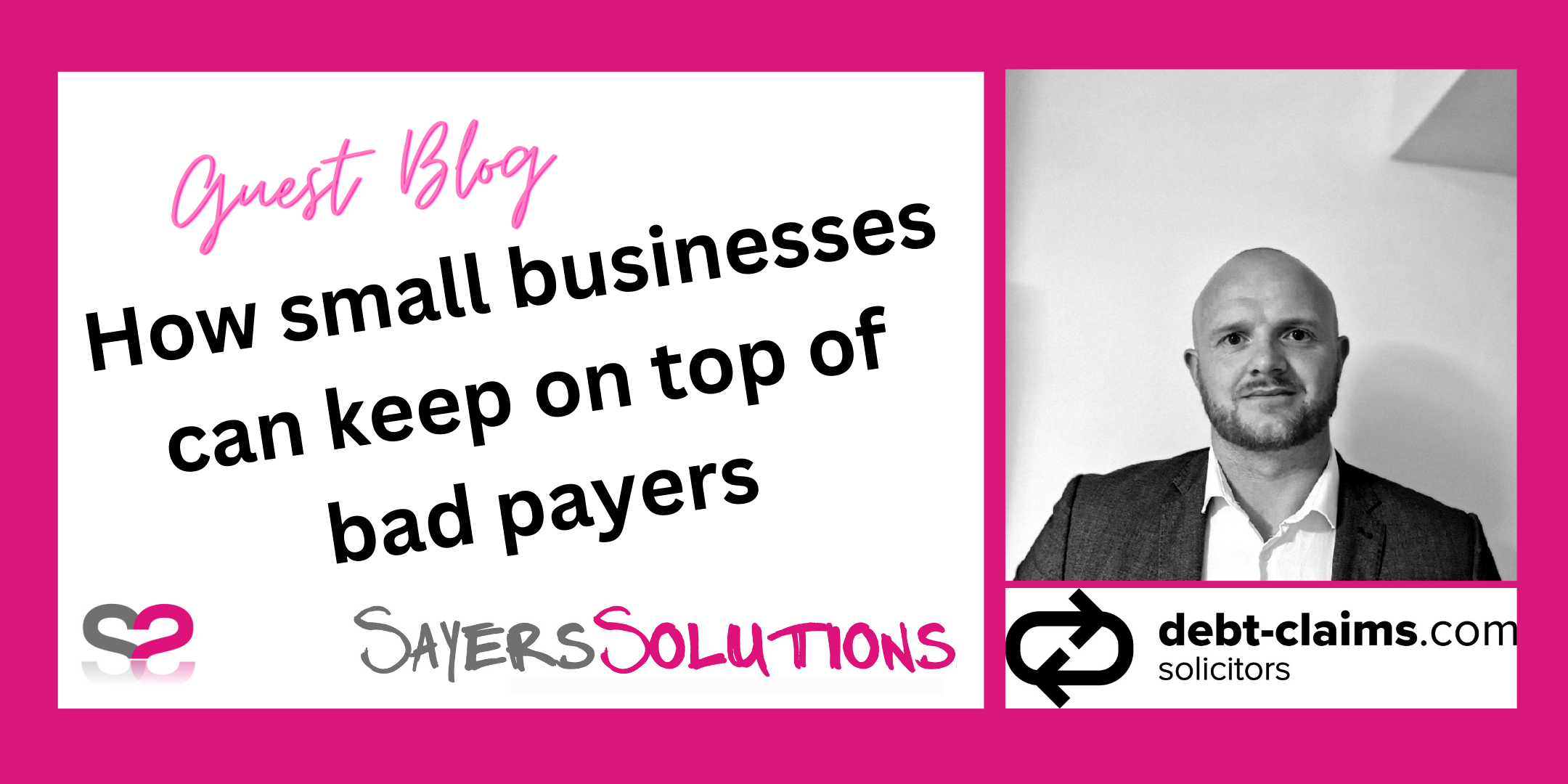How small businesses can keep on top of bad payers

While helping our clients focus on what they do best, we occasionally work with partners. As prolific networkers we get to meet and connect all sorts of businesses. In our one to ones with business connections, when we feel that there is useful and interesting information that will help you focus on what you do best, we invite the contact to write us a guest blog.
We met Robin Appleyard through FSB online networking events and when we finally arranged a one to one, we hit it off and totally appreciated what each of us were offering.
There is nothing worse, when running a business, than not getting paid – forget all the background admin, finance and marketing that has no immediate ROI … what about not getting paid for sales! When someone has taken your product or service and not paid what was agreed.
After a quick demo of the www.debt-claims.com website, we saw the value and ease the platform offered. And we agreed the PR from officially chasing up bad debt, for the starting cost of £2.50 with limited effort (and no costly meetings) was a price worth ‘investing’.
Unfortunately, we can actually report, the immediate positive impact from using the platform – thankfully not any Sayers Solutions clients … but as the system was so simple to use, we’d have no hesitation chasing bad debt this way.
Robin was very passionate about the right of the business to be paid, and how outrageous it was that people thought they could get away with it. This along with his knowledge and experience in the field made it a no brainer to invite him to share this thoughts through the medium of a guest blog. And here is what he has to say –
As a small business, keeping on top of your bad payers is paramount to keeping your business afloat – cash flow is vital.
Before invoices run the risk of becoming bad debts, there are proactive steps you can take to encourage early payment.
Simple actions such as stating your payment terms upfront or being flexible with the types of payments you can accept, along with regular reminders, will keep your invoices at the front of your customers’ minds.
If you have a particularly troublesome customer, you might want to also consider the use of a personal guarantee from another party, providing that extra layer of security in case the company is unable to pay.
Knowing exactly who you’ve contracted with is equally as important.
For example, you may know the customer as Bob’s Potatoes – but do you know if they’re a limited company or a sole trader? Knowing the correct entity of your customer might seem elementary, but the amount of court proceedings we have seen fail where a client is unsure who they’ve contracted with is alarming. Before you enter a contract, don’t be put off asking questions that will aide recovery efforts later on; prevention is better than cure, after all.
Now that you’ve got the pre-contract work sorted, make sure that you send your invoices out to the correct address, with any relevant PO numbers.
Particularly where the customer is a larger client, we see countless examples where invoices have not been paid because they’re lacking order numbers. With a lot of businesses operating automatic invoicing and payments, often the systems need this information to process an invoice quickly.
If a business doesn’t pay you on time it is vital to give it attention as soon as possible and a good credit control process should be adopted.
If you don’t have resources to conduct your own credit control, various businesses and individuals work as outsourced credit controllers and can assist, for as little as a few hours a week, to keep on top of your credit control.
Unfortunately, not every customer will pay despite the best credit control efforts. For these non-paying customers, the natural escalation is to refer the matter to a third party. This could be either a debt collection agency (DCA) or a law firm.
Generally, DCAs will use various letter, email, call, and text campaigns to contact the debtor and encourage payment.
A law firm, on the other hand, is more versed to short and decisive action, such as sending one or two pre-action letters, and then issuing court proceedings.
There is no right or wrong way, some clients prefer to use a DCA then move to a law firm, others opt straight for the legal route and it all comes down to personal preference. The key point is to act quickly, when your customer has not paid you, you can be pretty certain that they have stopped paying others and often, it’s a case of shouting the loudest to get paid.
Taking legal action against a customer is not as expensive as you might think, it’s also a lot more common.
For example, in quarter 3 of 2022, there were over 220,000 CCJs (County Court Judgments) entered with a total value of over half a billion pounds (https://www.registry-trust.org.uk/stats/q3-2022-statistics/).
With statistics regularly reaching those numbers, it is not unusual to see close to one million CCJs every year – which shows the sheer scale that the legal process is used to collect debt.
This article was written by Robin Appleyard who has specialised in debt recovery since 2015 and is the Head of Debt Recovery at Debt-Claims Solicitors.
If you or your business are owed money and you want a quick and cost-effective way to instruct a law firm that has proven results in debt recovery, then you can contact robina@askewslegal.co or visit www.debt-claims.com.





